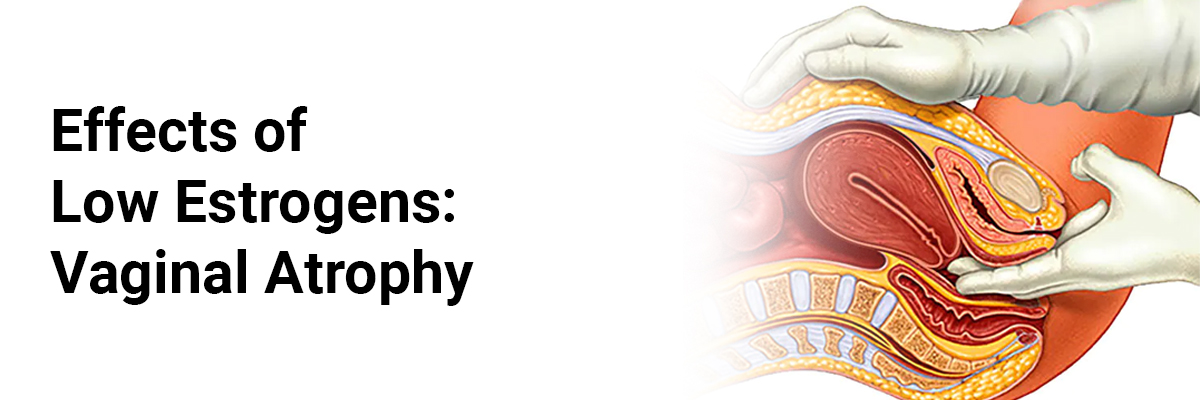
 IJCP Editorial Team
IJCP Editorial Team
Effects of Low Estrogens: Vaginal Atrophy
Women experience fluctuation in hormone levels during perimenopause, menopause, and postmenopause. If the hormonal levels are maintained low for a more extended period, it promotes various problems. Fluctuating estrogen causes hot flashes, night sweats, vaginal dryness, depression, and mood swings. We can overcome these problems by supplementing with phytoestrogens or hormone replacement therapy.
Low Estrogen levels can affect the vagina by causing conditions like Vaginal Atrophy. Estrogen helps maintain healthy vaginal tissue, which may cause bleeding after sex. During menopause, estrogen levels may fall by about 85%, affecting the woman's overall health and wellbeing, including physical, emotional, and sexual health.
Sleep disturbances from menopause may contribute to brain fog and increase the risk of heart disease, osteoporosis, and obesity. Further, there may be an appearance of unwanted facial hair and excess body hair due to the decline in estrogen levels and rise in testosterone and other androgens at menopause.
Women may also experience increased urinary tract infections due to the thinning of the tissue in the urethra due to decreased estrogen levels. Biochemically, estrogen regulates glucose and lipid metabolism. Thus its lower levels can result in weight gain. Low estrogen levels also generate a feeling of tiredness.
Vulvovaginal atrophy (VVA) is a common yet underreported condition in women experiencing hypoestrogenic states. During and after menopause, most women undergo vaginal atrophy due to less estrogen. This condition, together with its symptoms, is called genitourinary syndrome of menopause (GSM). VVA causes Vaginal rugae to disappear and the cervix to flush with the vaginal wall. The vaginal pH becomes acidic, which is the hallmark.
Vaginal dryness is usually the first sign, and GSM is typical. GSM is observed more in women who didn't undergo a vaginal birth. Women with Low estrogen may also encounter problems like vaginal dryness or burning, genital itching, unusual vaginal discharge, more fungal infections, burning during urination, frequent urination, urine incontinence, discomfort/ bleeding during or after sexual intercourse, lack of natural lubrication during sexual intercourse. Nearly 40% of women after menopause experience these symptoms; however, some may have them even during perimenopause.
The healthcare providers must manage vaginal Dryness and Pain at the earliest as the symptoms may get worse without treatment, and the vagina may feel itchy or dry all the time. Vaginal tissue tearing may cause slight bleeding after intercourse. A simple way to ease these problems is to have sex, as sexual activity raises blood flow to the vagina and helps it stay elastic. Vaginal moisturizers or water-based lubricants may ease GSM-related dryness and discomfort, particularly during sexual activity. Other alternate treatment options include Estrogen therapy to thicken the vaginal walls and reduce many other symptoms of GSM. Estrogen comes in various formulations like creams or suppositories to put into the vagina, a soft, flexible ring that the doctor inserts, and pills. Avoid using perfumes, scented lotion, deodorants, or powders on the pelvic area instead of unscented soap in cases of dryness, itching, or burning. Also, avoid tight clothes, panties, liners, and pads which may aggravate irritation because of synthetic material.
The use of lubricants during sex, vaginal moisturizers, low-dose vaginal estrogen, estrogen-like medicine, vaginal intravaginal dehydroepiandrosterone (DHEA) another hormone, hormone replacement therapy (HRT), for dryness and atrophy, are advisable. In cases of pain due to muscle or vaginal tightness, Pelvic floor therapy or Vaginal dilators are advisable.
Further, it's normal for sex drive to dip with aging. However, many other situations such as low self-image, stress, relationship issues, depression, or fear of pain during sexual intercourse, lower hormone levels, medication, or poor health conditions could also contribute to low libido.
Safe and effective long-term treatments will help ease vaginal dryness or pain with sex. Future research on VVA is needed to investigate the use of much lower doses of vaginal estrogens and develop newer delivery systems for non-hormonal therapy and SERMs that preferentially target urogenital tissues.
Gupta PD, Pushkala K. Effects of Low Estrogens: Vaginal Atrophy. J Gynecol 2021, 6(4): 000224.

IJCP Editorial Team
Comprising seasoned professionals and experts from the medical field, the IJCP editorial team is dedicated to delivering timely and accurate content and thriving to provide attention-grabbing information for the readers. What sets them apart are their diverse expertise, spanning academia, research, and clinical practice, and their dedication to upholding the highest standards of quality and integrity. With a wealth of experience and a commitment to excellence, the IJCP editorial team strives to provide valuable perspectives, the latest trends, and in-depth analyses across various medical domains, all in a way that keeps you interested and engaged.





















Please login to comment on this article